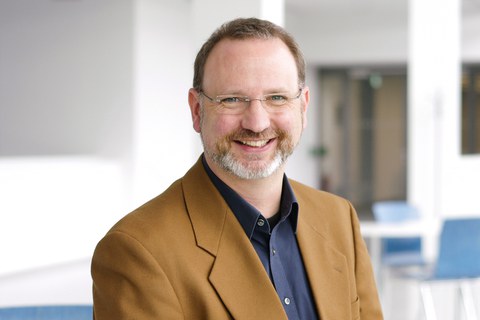Dec 12, 2016
Support for translational research: Europe wide cooperation on spinal cord injury research

Dr. Michell Reimer
Six European research teams including Dr. Michell Reimer and his team at the DFG-Center for Regenerative Therapies Dresden (CRTD) - Cluster of Excellence at the TU Dresden, received a 1.34 Million Euros ERA NET NEURON Grant for their research on spinal cord injury funded by the European Commission. The funding will start in 2017.
Spinal cord injury results from trauma to the vertebral column, usually caused by accidents during sport activities or driving. Injury of the spinal cord is a devastating condition for the individuals who suffer not only from paralysis but also chronic pain and impairment of bodily functions such as bowel and bladder control. In addition to the physical aspects of this condition, the psychological impact is tremendous. According to the World Health Organization (WHO)*, as many as 500,000 people suffer a spinal cord injury each year*.
Humans do not regain spinal cord function after injury. However, zebrafish have the remarkable ability to functionally recover from spinal cord injury. They repair injured connections, replace damaged motor neurons and oligodendrocytes, enabling them to regain full movement within four weeks after injury. This grant now allows six European partnering institutions from Germany, France, Great Britain, Poland and Belgium to use this tropical fish to identify novel targets and mechanisms to improve the functional recovery after a spinal cord injury, test these targets in mammals and translate the findings into the human spinal cord cells. Along with the CRTD, the collaborator team includes researchers from the French National Institute of Health and Medical Research (Inserm), the University Hospital Carl Gustav Carus Dresden, the Free University of Brussels (VUB) and the Nencki Institute of Experimental Biology of the Polish Academy of Sciences. The complete project is coordinated by the University of Edinburgh (UK).
Alongside this research, the collaborators work on developing new techniques to analyze changes within the spinal cord and tools to modify identified targets. “This unique consortium of six groups in five countries combines laboratories that would not have been able to work together outside of the European Research Area Network for Neuroscience Research (ERA-NET NEURON) funding program. It is truly exciting to be part of this team and I am certain that our work will have a significant impact on spinal cord injury research”, Dr. Reimer explains. The collaborators hope their findings will reveal new therapies that could improve the lives of patients with spinal cord injury.
The study is funded by the European Commission through the European Research Area Network for Neuroscience Research (ERA-NET NEURON) and co-funded through national funding agencies. Lead researcher Professor Catherina Becker, Director of the University of Edinburgh’s Centre for Neuroregeneration, said: “This exciting project brings together leading experts from across Europe to explore the intrinsic capacity of the spinal cord to repair itself. We hope this will eventually lead to urgently needed therapies for people who have damage to their spinal cord, either from disease or injury.”
Before becoming a research group leader at the CRTD in 2014, biologist Michell Reimer worked for five years as a Post Doctoral Fellow at the Centre for Neuroregeneration and the Centre for Cognitive and Neural Systems at the University of Edinburgh (UK). From 2005-2008, Michell Reimer completed his PhD in the field of neuroscience at the Centre for Neuroregeneration, University of Edinburgh and the University Hamburg, Germany. http://www.who.int/mediacentre/news/releases/2013/spinal-cord-injury-20131202/en/
Research group on the CRTD website
http://www.crt-dresden.de/research/research-groups/core-groups/crtd-core-groups/regulation-of-developmental-and-regenerative-processes-in-the-spinal-cord/
Publications
Barreiro-Iglesias A., Mysiak, K.S., Scott, A.L., Reimer, M.M., Yang, Y., Becker, C.G., Becker, T. (2015) Serotonin Promotes Development and Regeneration of Spinal Motor Neurons in Zebrafish. (Cell Reports, 13(5): 924-932)
Wishart T.M.*, Mutsaers C.A.*, Riessland M.*, Reimer M.M.*, Hunter G.*, Hannam M.L., Eaton S.L., Fuller H.R., Roche S.L., Somers E., Morse R., Young P.J., Lamont D.J., Hammerschmidt M., Joshi A., Hohenstein P., Morris G.E., Parson S.H., Skehel P.A., Becker T., Robinson I.M., Becker C.G., Wirth B., Gillingwater T.H. (2014) Dysregulation of ubiquitin homeostasis and β-catenin signaling promote spinal muscular atrophy. (J Clin Invest. 2014 Mar 3. pii: 71318. doi: 10.1172/JCI71318.) * These authors contributed equally
Reimer M.M., Norris A., Patani R., Zhong Z., Ohnmacht J., Dias T.B., Kuscha V., Scott A.L., Chen Y., Frazer S.L., Wyatt C., Higashijma S., Patton L., Panula P., Chandran S., Becker T., Becker C.G.(2013) Dopamine from the brain promotes spinal motor neuron generation during development and adult regeneration. Developmental Cell, Volume 25, Issue 5, 478-491
Reimer M.M., Kuscha V., Wyatt C., Sörensen I., Frank R.E., Knüwer M., Becker T., Becker C.G. (2009) Sonic hedgehog is a polarized signal for motor neuron regeneration in adult zebrafish.
J Neurosci. 29:15073-82.
Reimer M.M., Sörensen I., Frank R.E., Chong, L., Becker C.G.*, Becker T.* (2008)
Motor neuron regeneration in adult zebrafish. J Neurosci. 28:8510-16.
Media inquiries:
Franziska Clauß, M.A.
Press Officer
Tel.: +49 (0) 351 458-82065
Founded in 2006, the DFG Research Center for Regenerative Therapies Dresden (CRTD), Cluster of Excellence at the TU Dresden has now passed the second phase of the Excellence Initiative which aims to promote top-level research and improve the quality of German universities and research institutions. The goal of the CRTD is to explore the human body's regenerative potential and to develop completely new, regenerative therapies for hitherto incurable diseases. The key areas of research include haematology and immunology, diabetes, neurodegenerative diseases, and bone regeneration. At present, eight professors and ten group leaders are working at the CRTD – integrated into an interdisciplinary network of 87 members at seven different institutions within Dresden. In addition, 21 partners from industry are supporting the network. The synergies in the network allow for a fast translation of results from basic research to clinical applications. https://www.crt-dresden.de
